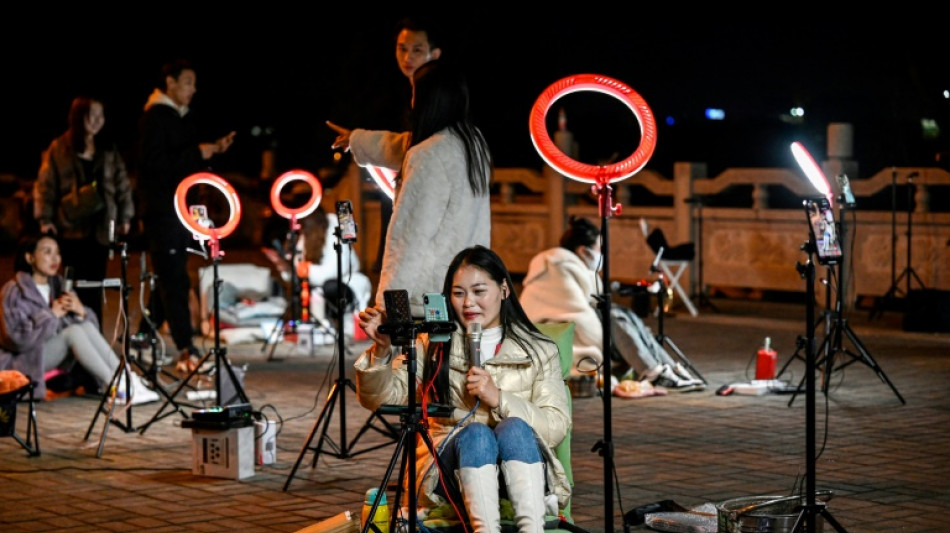
-
 Amnesty accuses Israel of 'live-streamed genocide' against Gazans
Amnesty accuses Israel of 'live-streamed genocide' against Gazans
-
Spotify posts record profit in first quarter

-
 Sciver-Brunt named as England women's cricket captain
Sciver-Brunt named as England women's cricket captain
-
GM profits top estimates, but automaker reviewing outlook due to tariffs

-
 Stock markets edge up as Trump softens tariff pain for auto firms
Stock markets edge up as Trump softens tariff pain for auto firms
-
Pricier trainers? Adidas warns on US tariff impact

-
 Spain, Portugal rule out cyberattack for massive blackout
Spain, Portugal rule out cyberattack for massive blackout
-
Suryavanshi, 14, dubbed India's next superstar after shattering records

-
 Power back in Spain, Portugal after massive blackout
Power back in Spain, Portugal after massive blackout
-
Pakistan says it shot down Indian drone along Kashmir border

-
 Cardinals run the media gauntlet ahead of conclave
Cardinals run the media gauntlet ahead of conclave
-
BP profit drops 70% amid pivot back to oil and gas

-
 Iran says fire contained after deadly blast at key port
Iran says fire contained after deadly blast at key port
-
Irish rappers Kneecap deny support for Hamas, Hezbollah

-
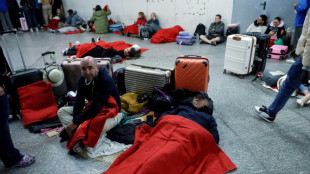 Blackout plunges Spain into chaotic night of darkness
Blackout plunges Spain into chaotic night of darkness
-
Convicted cardinal confirms he will sit out conclave

-
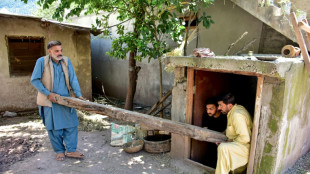 Kashmiris fortify bunkers anticipating India-Pakistan crossfire
Kashmiris fortify bunkers anticipating India-Pakistan crossfire
-
Adidas warns US tariffs to push up prices

-
 Markets boosted as Trump softens tariff pain for auto firms
Markets boosted as Trump softens tariff pain for auto firms
-
Suryavanshi, 14, dubbed 'next superstar' after batting records tumble

-
 Australian doubles player Purcell accepts 18-month doping ban
Australian doubles player Purcell accepts 18-month doping ban
-
Kashmir attack unites political foes in India, Pakistan

-
 Croatia hotel toasts dizzying century of stars, sovereigns and champagne
Croatia hotel toasts dizzying century of stars, sovereigns and champagne
-
Kenya's desperate need for more snake antivenom
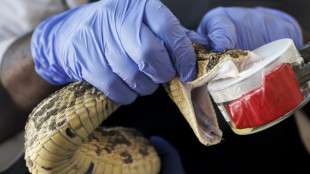
-
 Les Kiss in frame with Wallabies set to name new coach
Les Kiss in frame with Wallabies set to name new coach
-
Cavaliers scorch Heat, Warriors down Rockets in thriller

-
 Opposition wins Trinidad and Tobago election, returning Persad-Bissessar as PM
Opposition wins Trinidad and Tobago election, returning Persad-Bissessar as PM
-
Study sheds light on origin of Australia's odd echidna

-
 France tries Syrian Islamist rebel ex-spokesman on war crime charges
France tries Syrian Islamist rebel ex-spokesman on war crime charges
-
Trump boasts of 'fun' 100 days, but Americans disenchanted

-
 Elitist no more, caviar is turning casual
Elitist no more, caviar is turning casual
-
Amnesty accuses Israel of 'live-streamed genocide' against Gaza Palestinians

-
 Inter slump puts season at risk ahead of daunting Barca trip
Inter slump puts season at risk ahead of daunting Barca trip
-
Power returns to most of Spain, Portugal after massive blackout

-
 'I have hope': Vietnam Babylift survivor's search for birth mother
'I have hope': Vietnam Babylift survivor's search for birth mother
-
US climate assessment thrown into doubt as Trump dismisses authors

-
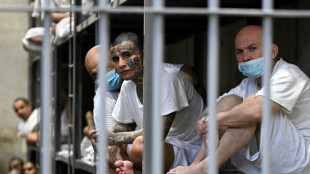 Venezuelan president slams US over little girl's 'abduction'
Venezuelan president slams US over little girl's 'abduction'
-
Hard-right upstarts eye big gains in local UK polls

-
 Skulls, smoke and spirits: Thai ceremony for the unclaimed dead
Skulls, smoke and spirits: Thai ceremony for the unclaimed dead
-
Canada's Carney: political newcomer who says he's best in a crisis

-
 Cavaliers scorch Heat to seal series sweep
Cavaliers scorch Heat to seal series sweep
-
Dead salmon create election stink on Australian island

-
 Mic check: Singapore's podcast boom amplifies opposition voices
Mic check: Singapore's podcast boom amplifies opposition voices
-
Markets rise as traders gear up for earnings, key jobs data

-
 Congress passes 'revenge porn' ban, sending it to Trump
Congress passes 'revenge porn' ban, sending it to Trump
-
Spain and Portugal work to restore power after massive blackout

-
 Less-thirsty rice offers hope in drought-stricken Chile
Less-thirsty rice offers hope in drought-stricken Chile
-
Yamal stardust could give Barca edge on Inter Milan

-
 Greene Concepts and BE WATER(TM) Keep the Southeast's Climbers Ready to Conquer
Greene Concepts and BE WATER(TM) Keep the Southeast's Climbers Ready to Conquer
-
Why Every Pool Owner Needs CPR and First Aid Training


Chinese livestreamers flock outdoors for late-night tips
In the dead of night on a bridge in southern China, around two dozen livestreamers sat crooning and chatting into microphones, their identical ring lights spaced a few metres apart in glowing rows.
The broadcasters gather in spots like this in the city of Guilin most nights with the hopes of catching the attention of online "passers-by" scrolling through livestreams on Douyin, China's version of TikTok, where viewers can donate to their favourite streamers.
"There are too many indoor livestreamers," said 27-year-old Qiao Ya, who works from 9:00 pm to 3:00 am every night.
"For indoor livestreaming you need to look pretty to be able to attract viewers, but I'm too average for that."
Outdoor broadcasting took off about a year ago, and conditions can be harsh.
When AFP visited this week, the temperature had dropped to almost zero degrees Celsius (32 degrees Fahrenheit), with streamers bundled in thick blankets and some bringing small heaters.
"Viewers might feel if we're outdoors or just by ourselves late at night that it's very tough, so they might be nicer to us," said Qiao, whose only income comes from donations through her stream.
Livestreaming on apps like Douyin, which said it had 600 million users in 2020, is a popular way to make money in China.
Some -- like "Lipstick King" Li Jiaqi -- have become celebrities, making millions of dollars in endorsements and advertising fees through the platform.
But for those on the bridge, the earnings are much slimmer.
On a good day, Qiao makes up to 600 yuan ($87) over eight hours of streaming. On a bad day, her takings can be as low as 10 yuan ($1.50).
Like most Douyin performers, Qiao is signed with a livestreamer talent agency, which takes a 10 percent cut of her revenue in exchange for equipment rental and management of her social media presence.
Douyin takes another 50 percent, leaving streamers like Qiao with just 40 percent of what they make.
Douyin's parent company ByteDance, which also owns TikTok, reported $18.3 billion in revenue in the first quarter of 2022.
- 'Side job' -
Most of the streamers on the bridge on Monday were young women, with one of the few men wearing a furry frog suit.
For eyebrow tattooist Zhang Xiaoxiao, the broadcasts are an extra source of income.
She said the Covid pandemic had hit her profession hard, with beauty salons crippled by health restrictions.
"Pressure was very high and business was bleak... If not for this, I don't think I would be livestreaming," explained Zhang, 36, as she set up to work until 3:00 am.
"I really enjoy singing and dancing, so I thought I would make it a side job, to be able to do something I liked."
Last October, Douyin issued a warning against public disturbances caused by outdoor livestreaming, though that has largely gone unheeded after an initial crackdown.
Zhang said sometimes people walking past react angrily to her.
"Some look at us with some discrimination. They ask 'Why don't you find a normal job?'" she said.
"So we choose a place far away from the residents, to try to not disturb people, and where it's very safe."
The streamers' agencies send men who act as assistants and bodyguards -- with some telling AFP they occasionally had to move drunk people on or block inappropriate online viewers.
Despite the risks, big donations keep livestreamers like Qiao coming back.
"One guy scrolled past my roadside livestream one night at 2:20 am and felt very touched," Qiao said.
The anonymous man gave her a 3,000 yuan ($435) donation.
"I was so happy that I went home early that night," Qiao said.
"Livestreaming is actually very simple, it's like making friends."
D.Moore--AMWN